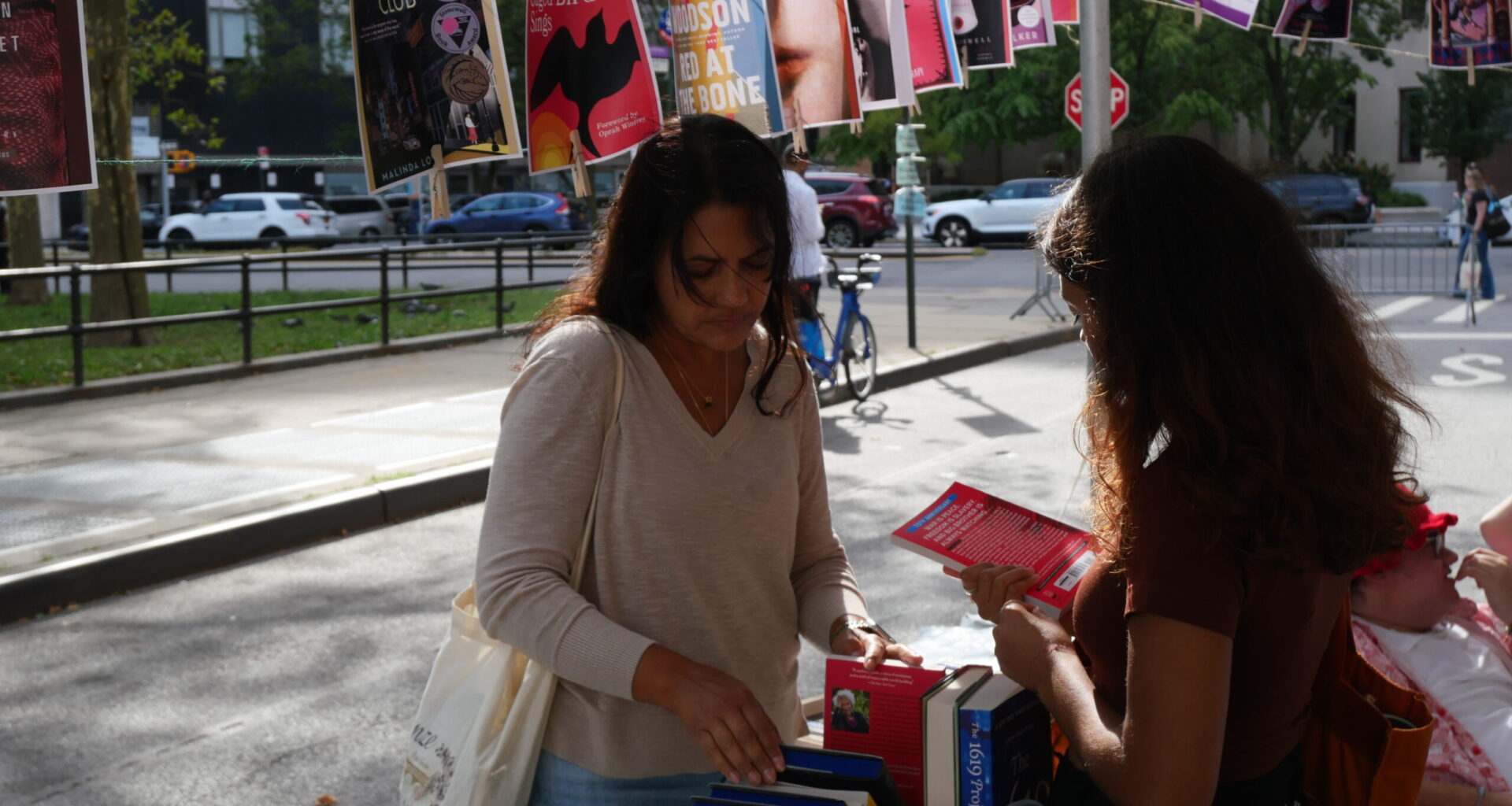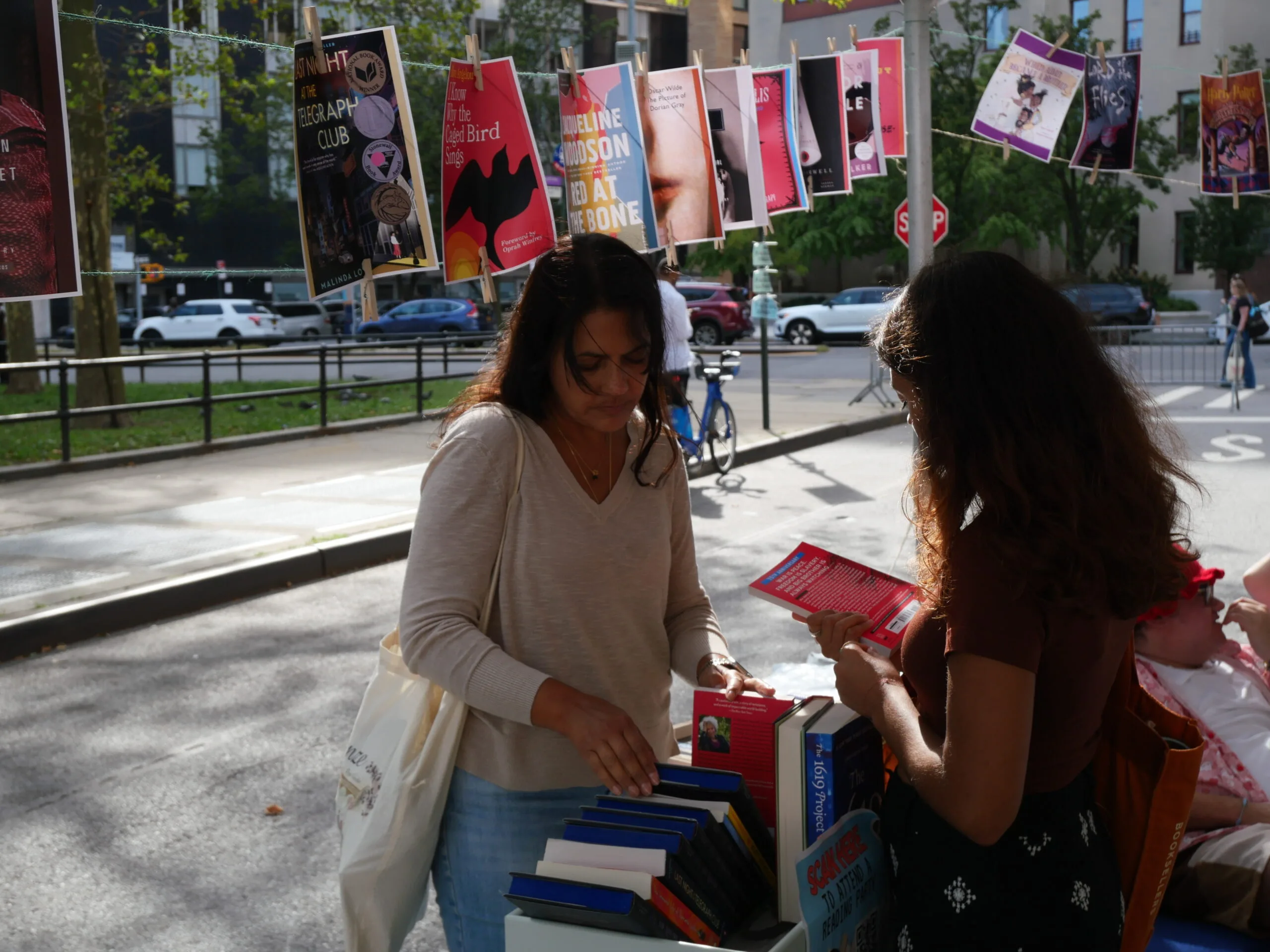
Last week, I arrived at the Brooklyn Book Festival, New York City’s largest free literary festival, and headed straight toward PEN America’s Banned Book Garden, organized in collaboration with Reading Rhythms. There were other stops on my list, and I was also hoping to collect a few (or perhaps dozens of) free books. But a garden curated by and for readers struck me as the proper way to begin the day.
When I arrived, festival-goers were browsing banned titles provided by Penguin Random House and curling up with them on a nearby couch and chairs, provided by Teak NYC.
I introduced myself to Izzy and Rachel, two friends who were walking around the festival when the cover of one banned book in particular caught Izzy’s eye. “I went, ‘Holy crap, Captain Underpants? That’s banned? Who would’ve thought?’” they said.
The pair, now 24, told me that the garden sparked a memory from their time at their New Jersey elementary school, where The Hunger Games series by Suzanne Collins was banned. But that didn’t stop them from getting their hands on the books: As Izzy explained to me, one of their peers snuck in copies of the books from home and passed them around to other students in their grade.
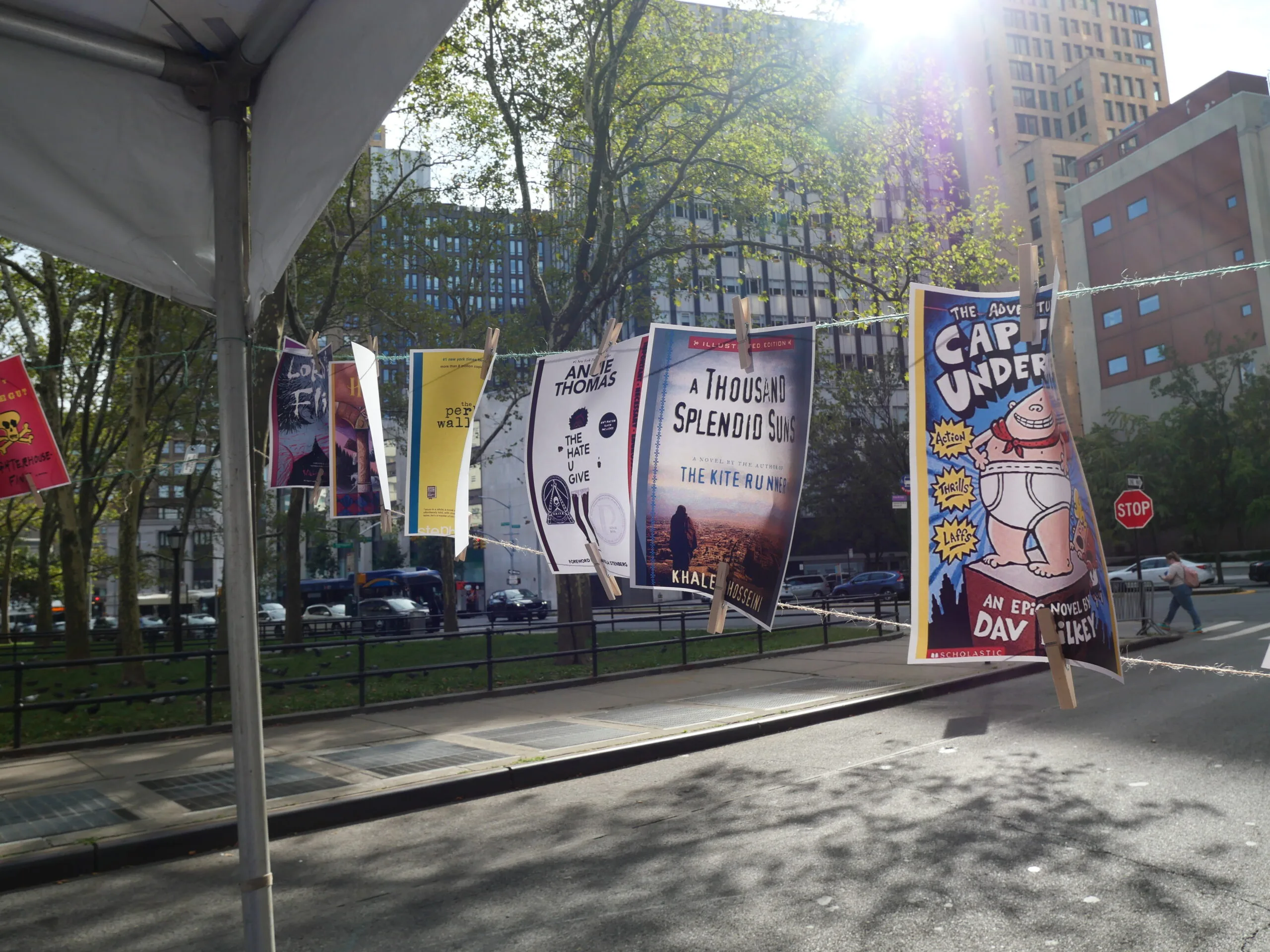
“I just remember there would be kids that I’d never even talked to, like a jock, and I remember he’d be whispering between classes, ‘Hey, it’s your turn for the copy. Go read it,’” they said. “It became like a secret club between everyone.”
Even with book bans on the rise, kids will continue to seek out literature and bond over it, Izzy said. “It builds a community, this passion for reading.”
Over the course of the afternoon, I chatted with many individuals milling around the tent. Some expressed shock after learning about the state of literary censorship, while others said they found it disappointing but unsurprising. But each of them responded in the same way to one question: When I asked if any of the books featured in the tent impacted them as a young reader, they all quickly swung around to point to at least one.
Nancy, who stopped by the garden with her daughter, told me she was horrified to learn that Judy Blume’s books were among the many that have been stripped from shelves. She fondly recalled reading Blume’s works — especially Are You There God? It’s Me, Margaret. — with all of her friends when she was 10 years old, adding that she had been dying for her daughter to read it too.
“That book taught me about my body,” she said. “That it’s banned is crazy.”
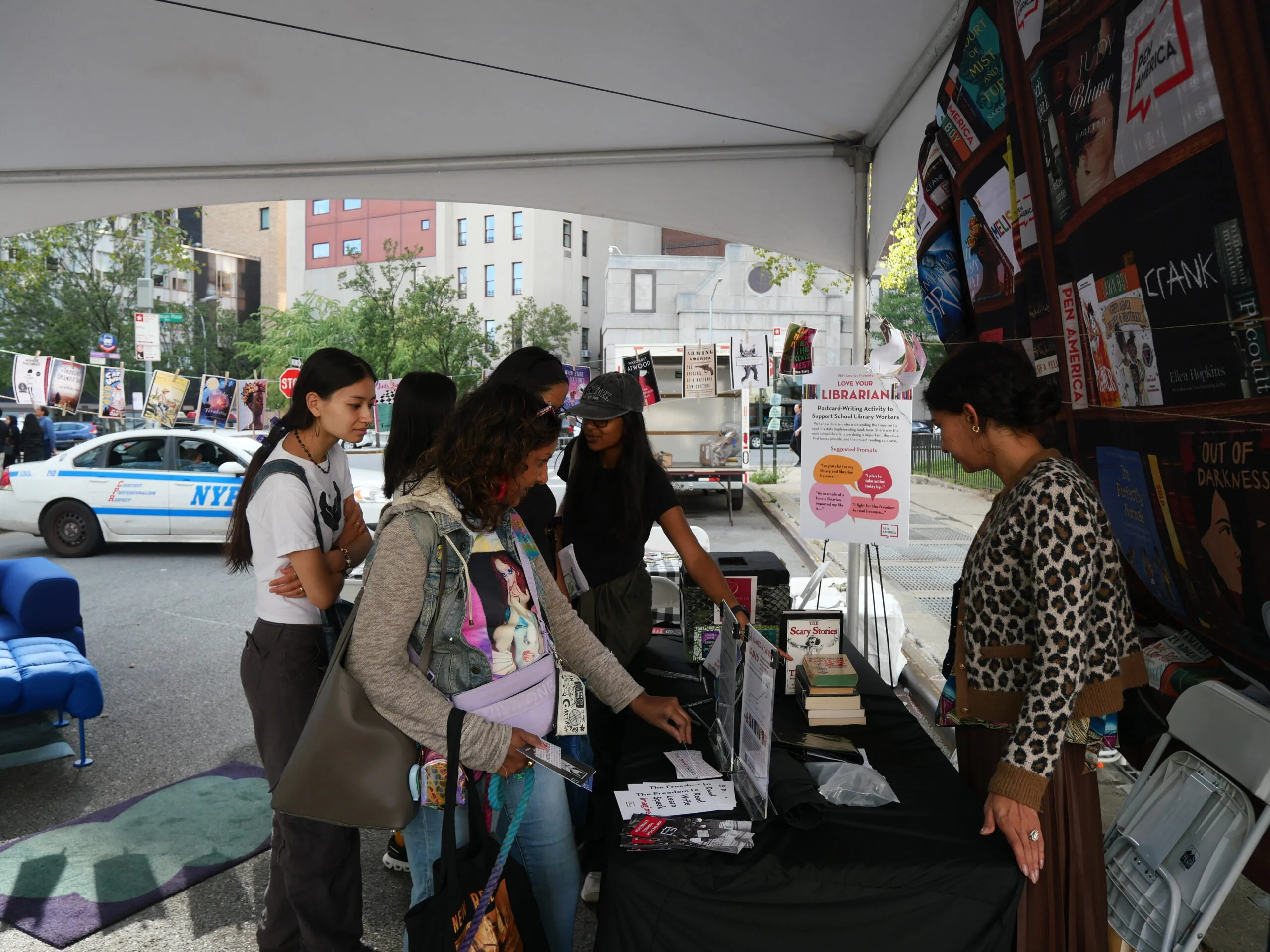
As a steady stream of visitors continued to flow in and out of the tent, I wandered to the back corner, where a few families had gathered so that their children could design bookmarks with crayons, stickers, and tassels. Geloah watched over her daughter, Batya, as she colored in the many geometric shapes she had outlined on her bookmark.
Geloah told me that when Batya, 8, spotted the PEN America poster at the front of the tent, she asked her mother for the first time why anyone would ban a book. “I said, ‘Because there are some places where people don’t like certain ideas, and they will try to make it so that people don’t read about those things,’” Geloah said.
When I asked Batya what she thought of book bans, she told me that they didn’t seem fair. “I don’t understand why people would take away things that other people like,” she said. “That’s the best way I can put it.”
Across the table from Geloah and Batya sat Dante and his daughter, Isabella. Isabella, 7, decorated bookmarks that she said she planned to use while reading her all-time favorite literature: Dav Pilkey’s Dog Man and Paula Harrison’s Kitty series. Referencing PEN America’s Index of Book Bans, I learned that Dog Man was banned in Hernando County, Florida, in 2023.
After joining the 7- and 8-year-olds to decorate a bookmark of my own, I wandered over to World Voices Festival and Literary Programs Manager Sarah Dillard, who was handing out postcards to visitors on which they could write words of encouragement to librarians in Florida. Once they finished, they could either drop the postcards in a box or pin them on a bulletin board for others to see.
“As a woman of color and a first-generation college student and American, I first found safety in a library,” read one of the postcards on the bulletin board.
“My mom always says, ‘No one is a troublemaker while they are reading a book,’” read another. “That may be true, but I’m sorry silly people think reading books makes trouble. You are the best kind of troublemakers!”
When 4 p.m. rolled around, I left the garden to attend “Portraits of the Everyday,” a panel that featured three authors with short story collections. An engrossed audience listened as Ed Park, Lynne Tillman, and Jared Temus read short excerpts from and discussed their work. PEN America’s Director of World Voices Festival and Literary Programs Sabir Sultan moderated the panel, inquiring about the rhythm of the authors’ prose, the structure of their collections, and the right way to go about ending a short story.
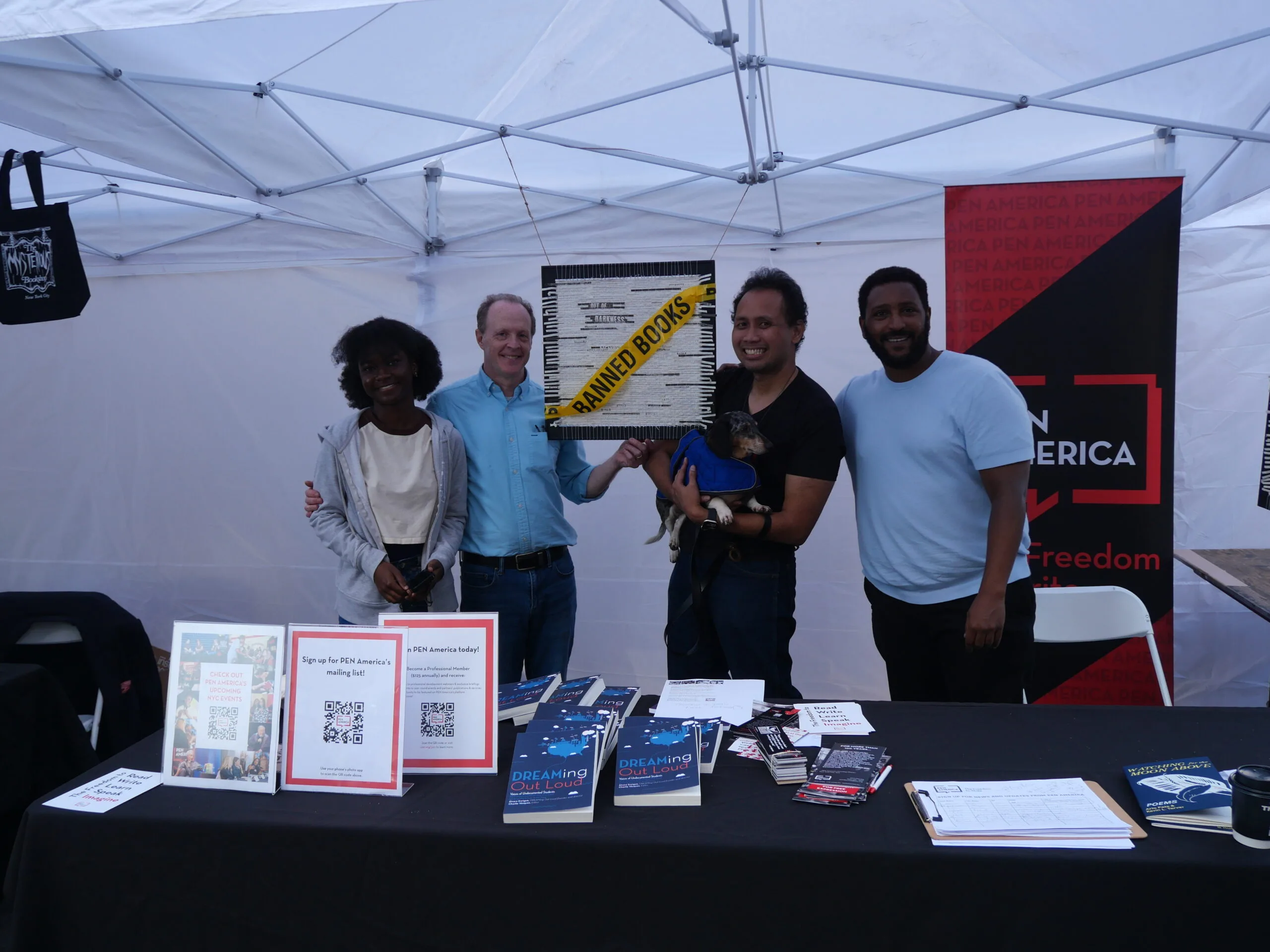
After the panel, I stopped by PEN America’s booth, where we were encouraging passersby to subscribe to our mailing list and offering them more information about upcoming events. We were also handing out books, postcards, and “I Read Banned Books” shirts designed by the author Mike Curato.
Visitors could also share their favorite banned book on a corkboard. George Orwell’s 1984 stood out as the clear winner, though many of the notes also featured books by Toni Morrison. Behind the booth hung weavings by the artist Ellis Angel, which she had made from frequently challenged books and caution tape.
I left the Brooklyn Book Festival as it was nearing its end, which meant my initial wish came true: Hosts of other booths, still in possession of too many books, began passing them out free of charge. By the time I arrived at my subway stop, my hands were filled with a new t-shirt, enough books to keep me occupied through the end of the year, and my very own bookmark to use while reading them.

